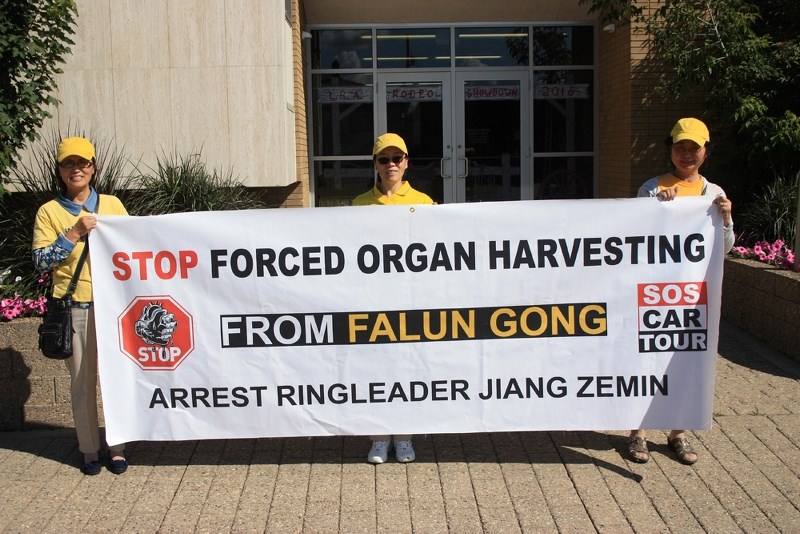The Falun Gong car tour stopped in at the Town of St. Paul office to educate and spread the word about crimes against humanity in China. The Tour included a Falun Gong practitioner who had been persecuted in China and held for three days, Chunyan Huang.
Falun Gong is described as a traditional Chinese self-cultivation practice that improves mental and physical well being by enhancing one’s heart mind nature (xinxing). The practice of Falun Gong came to China in 1992, but was banned in 1999 because the religion was not under state control, which provoked the persecution of its practitioners.
Any practitioners who refused to give up this way of life were put into labour camps and jails.
“Any religious practice that encourages people to think individually is condemned by the Chinese government, which is why Falun Gong practitioners are targeted. Over the seven years from 1992 to 1999, an estimated 100 million people were attracted to Falun Gong practices,” says Huang.
The first murmurings of crimes against humanity against these people came from a woman who worked at a hospital in China. She said 4,000 Falun Gong adherents were killed for their organs, and her husband, who was a surgeon, had removed 2,000 corneas from living Falun Gong prisoners.
Former Canadian Secretary of State and Crown Prosecutor David Kilgour and International Human rights lawyer David Matas released the first report in 2006 about the atrocities being committed to the Falung Gong prisoners of conscience.
The Falung Gong prisoners have been killed and had their organs harvested by the state. This differs from black market organ sales due to the fact that the practice is openly state run.
According to Huang, over 1.5 million people have had their organs harvested since the persecution and imprisonment of Falun Gong supporters began.
“We started this car tour to raise awareness of this new investigative report release in June . . . People across Canada and the world need to know about what is happening.” The report is called ‘An Update to Bloody Harvest and Slaughter.’
Another one of the reasons why Falun Gong practitioners are targets for organ harvesting, is because the practices prohibit consumption of alcohol, tobacco products or drug use, which means the organs of these people are typically very healthy, making them more valuable.
“The new report shows the evidence that there have been mass killings of these prisoners for their organs and for the profit, as it is a lucrative and profitable business,” said Huang.
Amongst the evidence of this killing, is the statistics that show that the average wait time for a kidney transplant in China is only 15 days, compared to 1,825 days in the United States and 1,095 days in the United Kingdom, according to information provided by Huang.
“Statistics show that this practice claims the lives of 60,000 to 100,000 people per year, which shows the scale of the how serious this issue. With globalization, the world changes quickly, and what I see is Canada depends on a lot of products from China, and many of these products are made in the forced labor camps in China, which is why the price is very low. People have even travelled to China to get an organ transplant because there are organs available before anywhere else,” says Shar Chen.
Both Chen and Huang are from China and live in Edmonton. Both Falun Gong practitioners.
The car tour calls for all Canadians to condemn what is said to be happening in China, and to add pressure to the Chinese government to end these human rights violations. The Canadian Parliamentary Subcommittee on International Human Rights adopted a motion condemning and calling for an immediate end to the state sanctioned forced organ harvesting from prisoners of conscience in China.
“Not very many people know about this, so we have to spread the word and condemn this, because it is a crime against humanity. Everyone needs to take a stand,” says Huang.
The group hopes that during Justin Trudeau’s visit to China to strengthen bonds between the two countries, that the issue of the organ harvesting will be addressed and dealt with, as well as during the G20 summit in China.



